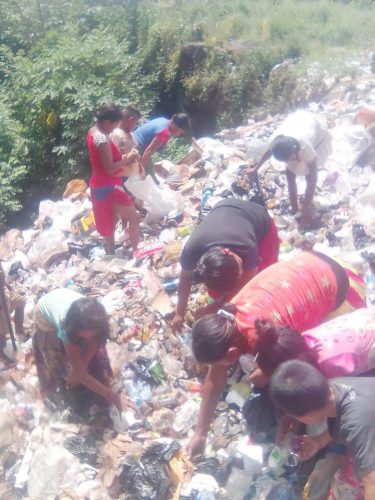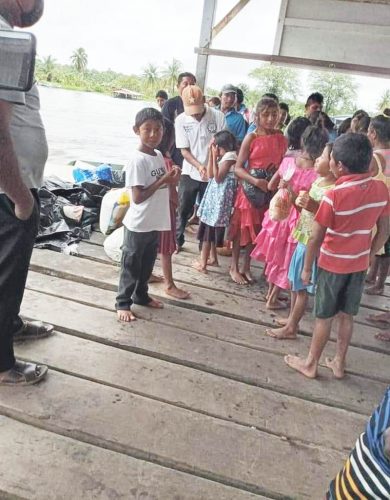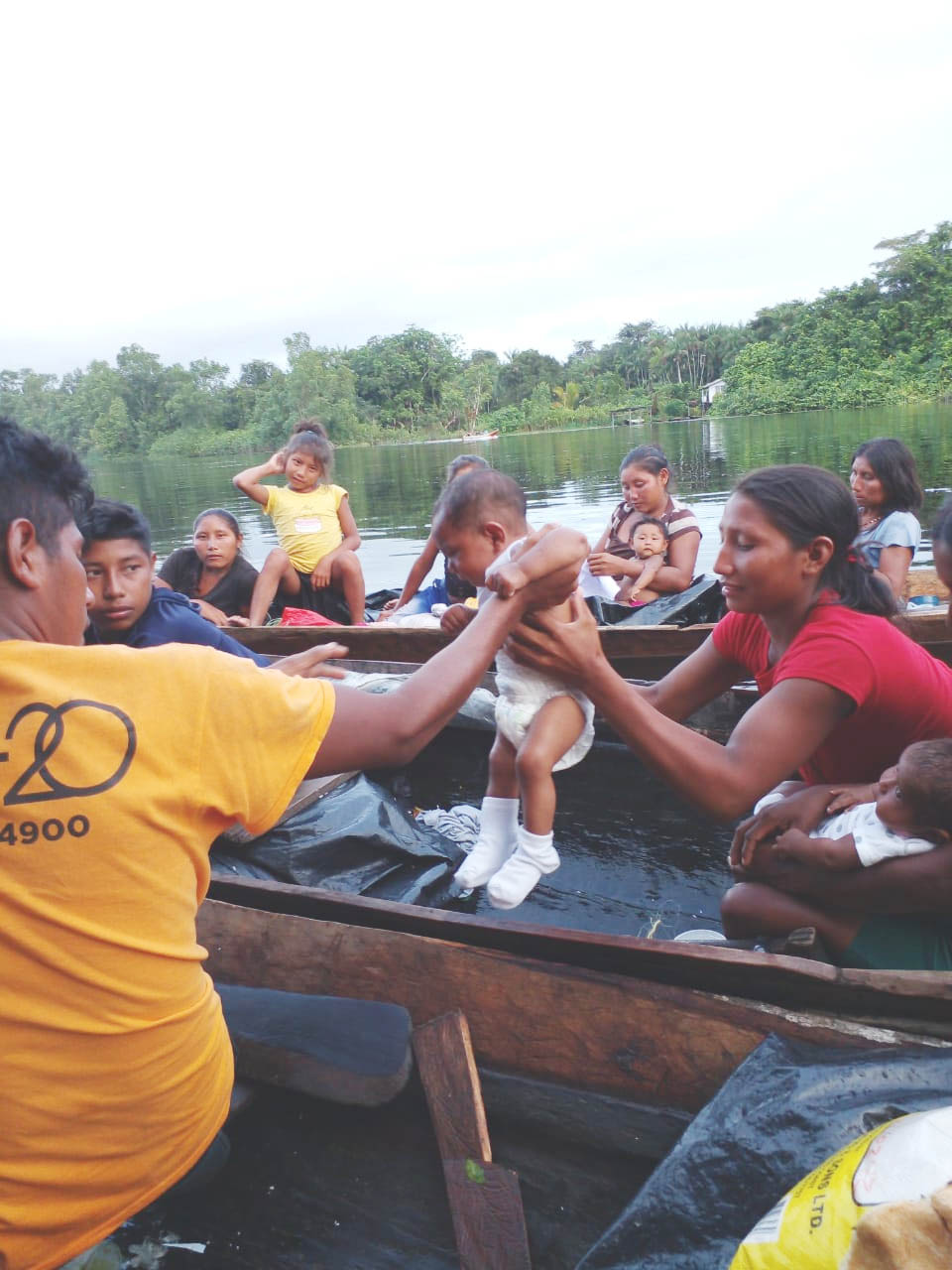The recent relocation of Warrau migrants from Kabakaburi, in Region Two, to what have been described as poor living conditions, has come in for strong criticism from those who were helping them to integrate and the Amerindian Peoples Association (APA) on Thursday called for authorities to provide increased humanitarian support.
The Regional Administration of Region Two (Pomeroon-Supenaam) along with the Guyana Defence Force Coast Guard is being accused of removing over 125 Warrau migrants from the community of Kabakaburi and deporting them to a camp in Region One under less than favourable conditions, without reason.
The Coast Guard removed the Warrau migrants, who journeyed from Region One to Kabakaburi in Region Two by canoe and placed them in a refugee camp on Khan’s Hill, Mabaruma. The banishment of the indigenous migrants from the Kakakaburi village was sudden and left the villagers there questioning the move.

Region Two Chairper-son Vilma De Silva had said that the arrival of the migrants was reported to the Regional Democratic Council (RDC) by the village police in the region. A medical team from the RDC had also visited the community, where the health of the migrants was assessed.
“The police went and they confirmed that it was like 125 persons – children and adults mixed – and as Regional Chair the first thing we wanted to know was if they come in with any sickness or anything so quickly we dispatched our health team to ensure that no sickness they are bringing into our area.
“They went to a location in Arpiaco [Pomeroon River] where they saw it was bushes and they think they could cut and clear and set up their camps but the Toshao from Kabaka-buri was there and he told them that they can occupy that area because of course we did not want them to mix with our residents because we have to know their health status,” De Silva had said during an interview with the media.
The Warrau nation is predominantly located between Venezuela and Guyana along the border in Region One. The economic situation has resulted in a number of Warrau people moving to Guyana. While some have relatives in Guyana, the others who are looking for a better standard of living have set up camps in various villages like Yarakita, Whitewater and Smith Creek.
Additionally, government has set up ‘refugee camps’ in various villages where the Warrau migrants dwell in less than favourable conditions.

When contacted yesterday, Minister of Amerindian Affairs Pauline Sukhai said that details surrounding the plight of the Warrau migrants have been sensationalised and that government is doing everything to support those that are vulnerable. Recently, a photo surfaced from Mabaruma of Warrau migrants scavenging through trash for food and has since sparked a renewed call for the situation to be urgently addressed.
When asked why the migrants were removed from Kabakaburi, the minister said “The Warraus that I understand was occupying a portion or area in the Pomeroon River was removed having found that they were not at risk but their situation is a bit vulnerable.”
She said that they were relocated to where they had “friends and relatives”.
However, she could not say what the circumstances were surrounding the removal but challenged the contentions by residents that the migrants were removed although they were being helped by the community.
Region Two Chairman De Silva said that she is also unaware as to why the migrants were removed.
“On the day that they were being removed, I was in the office when I got word of it. It was the soldiers that did the removing and I cannot say why they were being removed,” she said.
Stabroek News has learnt that persons working with the migrant population have been informed of an internal policy where the migrants are not allowed to move between regions. However, this was denied by Minister Sukhai and calls to Minister of Foreign Affairs Hugh Todd were unsuccessful.
Forcible removed
Carlyle Lowe, one of the residents of Kabakaburi told Stabroek News that he was working with several village leaders to get the Warrau migrants settled in the village before they were unceremoniously removed by the authorities. He said that the Warraus started arriving in the village on November 14, 2021, and since then the residents have been assisting them. He added that initially 25 Warrau migrants arrived in the community and that influx was followed by approximately 80 more that undertook the more than eight days journey from Region One into the Pomeroon River.
“They came here since November last year and even partook in the Christmas celebrations and they have been grooving in…we were teaching them to become independent and how to do stuff and had jobs for them in the village and no and now they are taken to Wauna with no jobs and no way to be independent,” he said.
Lowe explained that they are baffled as to the rationale behind the removal of the migrants from the village when they have been welcomed by the indigenous village. He added that after the regional authorities got wind of the migrants’ arrival, they sent in a team of health workers who assessed them and officers from the Charity Police Station also visited the village.
“They came up and pay them a visit to see the condition they are living in whilst we were there erecting houses for them. Myself and three other members of the community reaching out humanitarianly, we were there when the officials came
“Also, the officials from the Major Crimes Unit and Trafficking in Person Unit came up and questioned them how they had reached there and they all gave details and they said okay. They took down the names of people. They took their information and they gave them the three months’ stay documents,” Lowe said during an interview with Stabroek News.
The Immigration Officials granted the migrants a three-month permit and informed Lowe and other volunteers to ensure that they are renewed upon expiration.
“That was a Saturday [March 05] that they get the permit and then the Monday morning the Sergeant from the [Charity] Police Station come for me and tell me that I must go with him and tell these people [and explain what is happening].
“When I reached there, they caught me off guard because I did not know they were going to remove them and they were forcibly removed from our village. They [authorities] didn’t ask the toshao’s permission, nothing. They just came and move them out which is wrong. Our village have a law. We have laws and you cannot just come and bypass our laws just like that,” Lowe said.
Stabroek News on March 12 erroneously reported that toshao of the community, Monty Simon, had said that the Warrau migrants begged him to stay in his area and after he acceded to their request, they started to destroy residents’ crops and clear lands, which he could neither condone nor tolerate. However, that is being disputed by the toshao, who said that the community was working with the migrants to get them settled and no farms were being destroyed by them. Stabroek News regrets the error.
Lowe said that he has been in contact with some of the migrants, who are complaining of the less than favourable conditions they are forced to live in.
“They sent me videos and showed me the condition which they are living under and it is not good condition they are living in. The Warraus are normally known as the canoe people, they dwell over the water and they are not people who live on the hilltop. So, in our village here, we had given them a place along the riverain area to build their house, which we had already started to do before they were removed…,” he explained.
He added that they are also worried about the welfare of the children, since many of them were already incorporated into the school system.
Increased support
Meanwhile, the APA yesterday issued a call to the relevant authorities to provide increased humanitarian support to the Warrau migrants who are fleeing the economic situation in Venezuela. It also called on the authorities to address “their needs as Indigenous Peoples with human rights.”
APA said in a statement that their call stems from the forced relocation of the migrants from Kabakaburi village even after the indigenous community began to support them and have since indicated their willingness to support them.
“The migrants reportedly paddled for 8 to 10 days before arriving in Kabakaburi, where it was evident that they lacked food, clothing, and in some cases, medical attention. Their decision to undertake such a lengthy and dangerous journey speaks to the desperation of people whose lives are severely impacted by the ongoing economic crisis in Venezuela and the COVID-19 pandemic.
“The APA understands that the camp in Khan Hill, Mabaruma District, where these Warraus families have settled, has become overwhelmed. As we continue to battle the COVID-19 pandemic, such living conditions will only increase the likelihood of disease transmissions among the population, including COVID-19. Several of the migrants who were relocated remain in contact with residents of Kabakaburi. These migrants continue to call, begging to return for an opportunity to improve their living conditions,” APA said.
It added that the migrants should be given support specific to their needs and that better coordination is required to include short to long term responses. It also reminded of Guyana’s commitments to providing humanitarian support under international conventions.
“Additionally, where village councils or villages extend their humanitarian arm, the government should support them. There are pregnant women, children and the elderly who are all caught in this crisis. As a nation, Guyana must ensure that relevant and effective support is provided to all who are seeking it and to all who are lending support.
“It should be not lost that the Warraus are part of the demographics of Guyana and Venezuela and that only an international boundary separates the families. They have also contributed significantly to Guyana’s rich cultural and historical heritage including the shell mounds found in North-western Guyana, the origins of the canoe in Haimaracabra, Moruca and the planting of cassava in the Aruka River basin. These brothers and sisters are at home. They ought to be treated with dignity,” APA reminded.
Assisting as much as possible
Region One’s Chairman Brentnol Ashley told Stabroek News that the Warraus have been settling in the region for over five years now and that government has been working collaboratively to address their immediate needs. He added that there are currently over 200 Warrau migrants settled at Khan’s Hill and they are being provided with humanitarian assistance.
“The Ministry of Amerindian Affairs with the intervention of Minister Sukhai… have provided zinc sheets and equipment, such as power saws and so, to construct their homes. We would have had through UNICEF and GWI the construction of sanitary facilities for them in the host communities they are in. We have continuous provision of food hampers to these migrant families.
“The provision of health services to them as well and through agencies such as UNCHR, UNICEF, and other international organisations like IOM and so forth. They… have been receiving some educational support as it relates to having somebody paid to teach them English,” the Regional Chairman said.
Ashley said that the government and RDC have been working together to find a suitable place to create a settlement for the migrants and explained that they have received 5 acres of land in the Mabaruma sub-district from the Broomes Estate but had to refuse it since the land was in a swampy area. They are now working with the Guyana Lands and Survey Commission to identify a suitable plot for the creation of a permanent settlement.
“As you know the Warrau nation, they don’t always settle one place for a very long time. They are back and forth between Guyana and Venezuela because some of them would have planted farms from where they would have come and when it is time to harvest these produce they would go harvest and come back,” he said.
Back in November last year, reports of a number of severely malnourished indigenous migrants being discovered in Port Kaituma started circulating on social media, which prompted immediate government intervention.






